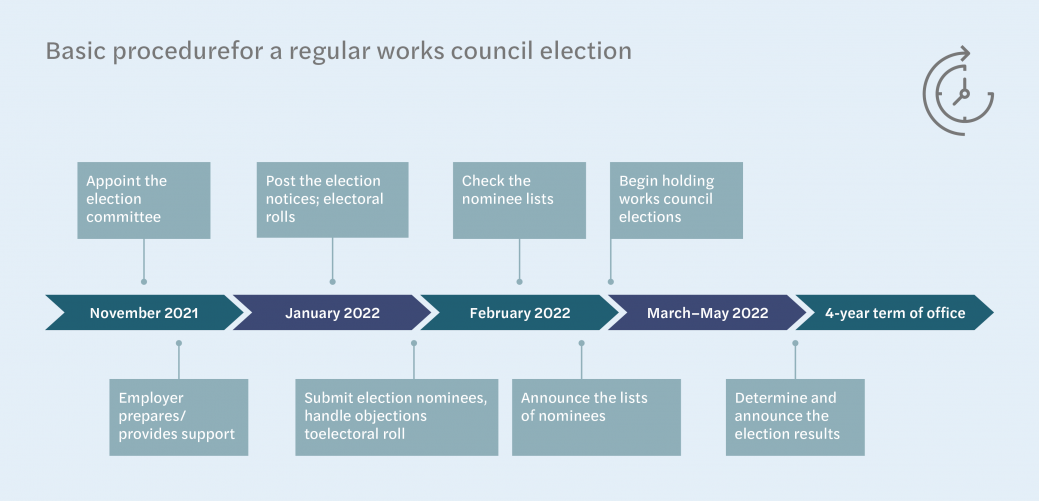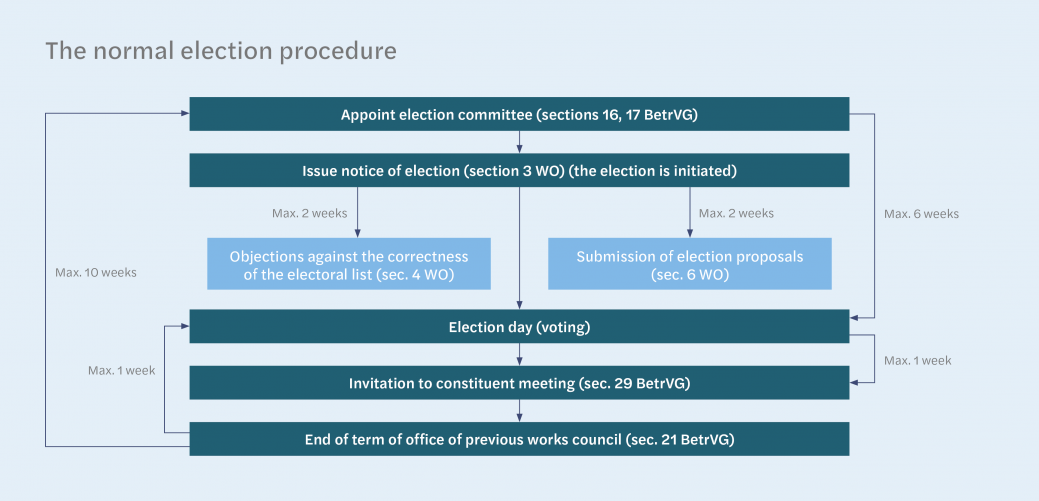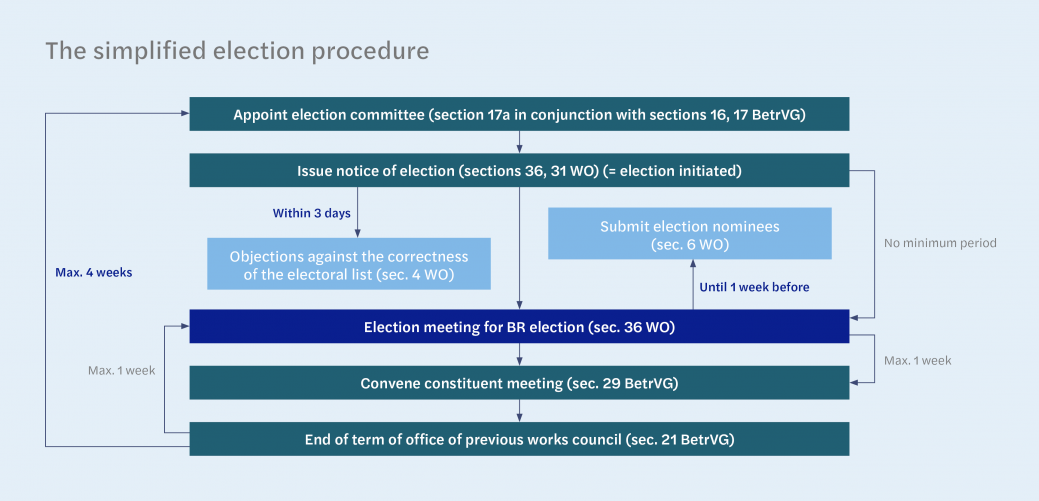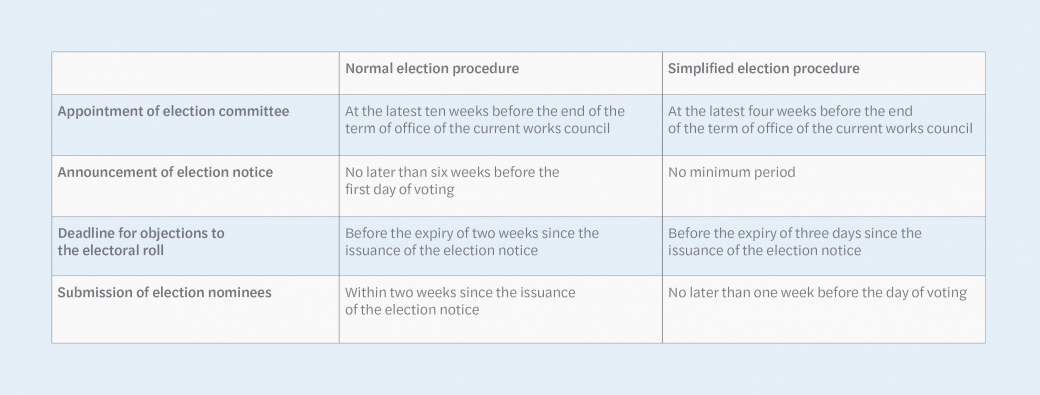
Works Council Elections 2022 in Germany – A brief overview
The legal requirements for these have changed, presenting employers with new challenges. Mid-2021, the new German Act on the Promotion of Works Council Elections and works council work in a digital environment – named the “Works Council Modernisation Act” (in German: Betriebsrätemodernisierungsgesetz, BRMG) – came into force. It is intended to facilitate the holding of works council elections, expand the number of eligible voters, make it easier for candidates to run for office, and strengthen the protection for workers involved in the election. There are also changes to the electoral regulations (in German: Wahlordnung, WO) that need to be considered.
The following article outlines the main features of the works council election process, discusses the BRMG changes to works council elections, and explains how the works council elections are conducted. We conclude by giving specific recommendations and practical tips on the role of the employer in works council elections.
Our goal is to help you understand the basic processes and considerations, assist you with proven expertise, and give you practical advice for the upcoming works council elections.
The German Labour Law Practice Group at Mazars will be happy to advise you with any questions you may have as to preparing for and conducting works council elections, discuss any possible flexibility available to you, and illustrate any mistakes to be avoided.
Overview of topics:
- Basic features and organizational workflow of a works council election according to the new German rules
- New legal requirements for works council elections
- Rights and duties of employers in connection with work council elections
- Summary and recommended actions
Basic features and organizational workflow of a works council election according to the new German rules
The legal basis for works council elections can be found in the German Works Constitution Act (Betriebsverfassungsgesetz, BetrVG) and the relevant Election Regulation (Wahlordnung, WO). These stipulate that works councils can be elected in German business units with, as a rule, at least five permanent employees entitled to vote, three of whom are eligible for election.
However, there is no obligation to elect a works council. Employers are prohibited from attempting to prevent a works council from being formed.
1. Procedure for holding a works council election
Appoint the election committee
The main organiser of a works council election is the election committee. It is responsible for conducting, initiating, and managing the works council election. An existing works council must appoint an election committee no later than ten weeks before the end of its term of office. This is done by regular works council resolution; the three members of the election committee including the substitute members are elected.
If there is only one central works council, it must elect the election committee. If there is no central works council, the group works council appoints the election committee. If there is neither a central works council nor a group works council, an election committee is elected at a works meeting (in German: Betriebsversammlung). Three employees of the relevant business unit entitled to vote or a trade union represented in the business unit may issue an invitation to this works meeting.
Election committee members are entitled to time off from work with continued payment of remuneration if they miss working time as a result of their official activities. If they carry out activities outside their working hours, they are entitled to compensation in accordance with section 37 (3) of the German Works Constitution Act (BetrVG).
The office of the election committee ends with the convening of the constituent meeting of the new works council.
Prepare for the election - done by the electoral board in collaboration with the employer (electoral rolls)
The election committee shall draw up a list of all persons entitled to vote (electoral roll). To this end, employers must provide the electoral board with all the information necessary to prepare the electoral list and make the necessary documents available. This includes the question of whether temporary workers (in German: Leiharbeitnehmer) are entitled to vote and which workers are executive employees (in German: Leitende Angestellte).
Post the election notices and electoral rolls
No later than six weeks before the first day of voting, the election committee shall issue the election notice signed by the chairperson and at least one other voting member of the election committee. The election notice must inform the workforce about the details of the works council election. The statutory minimum contents of the election notice can be found in section 3 subsection 2 of the WO.
Practical advice:
Errors in preparing the electoral list or issuing the election notice may lead to the election being contested. This is especially the case if required information is missing or incorrect in the election notice. Corrections can now be made up until the close of voting on election day. Employers should therefore carefully check the electoral roll and election notice with regard to their content as well as the correct operational term.
A violation of the six-week period described in section 3 (1) sentence 1 of the WO also entitles the employer to contest the works council election.
The electoral list and the WO must be displayed in the workplace from the day the election notice is issued and posted.
The electoral list and the WO shall be displayed in the workplace from the day the election notice is issued and posted. If everyone can take note of it and arrangements are made so that changes can only be made by the electoral board, publication in electronic form only is permissible.
Handle objections to the electoral roll
For any objections challenging the correctness of the electoral list to be considered for the works council election, they must be submitted in writing to the election committee no later than two weeks after the election notice was issued (section 4 of the WO).
Submit election proposals (supporting signatures)
Nominations can be made by employees entitled to vote and by the trade unions represented in the relevant business unit. In business units with generally up to 20 employees entitled to vote, candidates do not need signed nominations (supporting signatures). In business units with generally between 21 and 100 employees entitled to vote, nomination signatures are required from at least two of the employees entitled to vote, and in business units with generally over 100 employees entitled to vote, nomination signatures are required from at least 1/20 of the employees entitled to vote. However, even in companies with over 1,000 employees entitled to vote, candidates do not require more than 50 supporting signatures.
If more than five members of the works council are to be elected, the election shall be held using a list of nominees, with the individual candidates listed in a recognisable order using consecutive numbers and stating for each the surname, first name, date of birth, and type of employment in the business unit.
Check the lists of candidates
The election committee must promptly examine the list of candidates, if possible, within two working days of its receipt. If anything on the list is found to be invalid, or there are objections, the committee must immediately inform the list representative in writing, stating the reasons (section 7 of the WO).
Publish the lists of candidates
The lists recognised as valid must be publicised. If several lists of nominations have been submitted, they must be assigned an order number by lot. Voters may only cast their vote for a list of nominations recognised as valid.
Hold the works council elections
The works council is then elected by secret and direct ballot (section 14 BetrVG). The election of the works council in the normal election procedure is carried out according to the principles of proportional representation. An exception is only made in accordance with the principles of majority voting (election of individual persons) if only one nomination is submitted or if the works council is to be elected using a simplified election procedure (section 14 subsection 2 BetrVG, for further explanation, see p. 7). In proportional representation, the employees entitled to vote elect lists of candidates. Proportional representation is therefore also called list voting. Each voter may only choose (mark) one list (section 11 subsections 1 and 2 WO).
Active right to vote
All employees of the business unit who have reached the age of 16 are entitled to vote. Temporary agency workers are entitled to vote if they have been employed in the business unit for more than three months. The assessment is based on the intended duration of employment and not on how long the temporary worker has already worked in the business unit of the hiring company (in German: Entleiher) at the time of the works council election.
Passive right to vote
All persons entitled to vote who have reached the age of 18 and have been employed by the business unit for six months are eligible. Employees on parental leave and women on maternity leave are also eligible to vote as they are only temporarily not included in the business unit. Employees who have been dismissed are not entitled to vote if, at the time of the election, they have already actually left the business unit after the expiry of the notice period or upon receipt of the extraordinary dismissal. According to the case-law of the German Federal Labour Court (BAG), they are eligible for election during the duration of proceedings for protection against dismissal even after they have actually left the business unit; however, their right to perform the duties of the office is suspended during the proceedings. Only employees who are registered on the electoral roll are entitled to vote and stand for election. Temporary agency workers who are entitled to vote have only the right to vote.
An employee's seniority is not dependent on whether the employee’s work for the business unit is their primary activity or whether they are considered a permanent employee. Temporary workers who are in permanent employment on election day and workers hired on a fixed-term basis are also entitled to vote. If an employee is regularly employed on the basis of an employment contract limited to several days, the chain of fixed-term employment relationships is to be regarded as a uniform employment relationship within the meaning of the German BetrVG. The employee is therefore entitled to vote for the works council even if the election takes place outside a period of employment. The elected persons are notified in writing and their names are posted. A constituent meeting must be convened within seven days after election day.
The number of works council members to be elected is determined by the number of regular employees. In smaller companies (five to 100 employees entitled to vote) the number of employees entitled to vote is decisive, in large establishments (from 101 upwards) the number of employees per se. The number of persons entitled to vote is determined by the date of the election notice. Temporary workers who are regularly employed are counted, but not workers from external companies working in the business unit.
Determine and announce the election results
When the time period for casting votes as stipulated in the election notice has expired, the casting of votes is completed. The votes are always counted immediately afterwards. The time and place of the counting must be announced beforehand. If the election is conducted as a personal election, the candidates who received the most votes are elected. If the election was conducted as a list election, the members of the works council are determined according to a specific counting procedure (d'Hondt maximum number procedure – in German: d'Hondtsches Höchstzahlverfahren).
2. Legal nature of a works council election
An important first question is whether the election will be held using the normal or simplified election procedure. This must be clarified beforehand.
In companies with five to 100 employees, the simplified election procedure is generally used. In companies with 101 to 200 employees entitled to vote, the election committee generally has the option of voluntarily using the simplified election procedure.
The size of the works council depends on the number of regularly employed (eligible) workers in the business unit.
Caution is advised when assessing but rather groups of people: Part-time employees and mini-jobbers (those earning less than 450 Euro/month and working fewer than 70 days/calendar year) are taken into account, but freelancers and executives are not.
Temporary employees are taken into account if they meet a permanent employment need and work in the business unit for more than half of the year. Employees leaving the business unit are not counted if the position is to be eliminated completely and there is no replacement.
The biggest difference in the election procedures is that the simplified election procedure can be carried out significantly faster overall than the normal election procedure.
Further differences are to be noted in the electoral systems. The simplified election procedure is conducted as an election of persons, but the normal election procedure can be conducted as either an election of persons or a list election (proportional representation). In the personal election, the employees elect the candidates directly, but in the list election entire lists of candidates are elected. In this case, it depends on whether several lists of candidates were submitted. If this is the case, a list election takes place, if not, a personal election takes place.
Elections are conducted as a ballot box election. However, those who are unable to vote in person at the workplace due to absence at the time of the election can cast their vote in writing by mailing in their ballot. If working from home becomes compulsory again due to the pandemic, voting by mail could be a major factor in the elections held in spring 2022. The election committee must hand out the voting documents required for postal voting to employees who are prevented from voting at the polls. These documents are the election notice, the lists of nominations, the ballot paper including the ballot envelope, a pre-printed declaration of personal voting, and a stamped return envelope.
3. Challenges to the election
The election of the works council can be contested within a period of two weeks after the announcement of the election result at the labour court by three employees entitled to vote, a trade union represented in the business unit, or the employer if essential provisions of the right to vote, the eligibility, or the election procedure have been violated. Grounds for contestation are therefore, for example, if the election committee has misunderstood the operational terms used, if the election procedure used was incorrect, the concept of an active/passive right to vote was misunderstood, the business unit’s size was incorrectly assessed leading to a committee of the wrong size, or if there were formal errors in the election procedure. For the employer, it should be noted that the works council election is rendered contestable if the election is obstructed and employees are restricted in their right to vote or stand for election. The employer may not influence the election of the works council by inflicting or threatening disadvantages or by granting or promising advantages.
The election committee must provide all the necessary information in the election notice to protect the election from being contested. This also applies if the election committee makes mistakes in the mandatory information. The employer is therefore well advised to thoroughly check the election notice. Particular attention should be paid to the use of the correct operational term.
If the election is contested, the works council remains in office until the election results are determined, and all decisions taken in the meantime remain in effect.
In individual cases, a works council election may also be void if essential principles of electoral law have been violated to such an extent that there is no longer even the semblance of an election in accordance with the law. In such cases, works agreements concluded are null and void, and any actions taken (e.g. refusal of consent) are invalid.
New legal requirements for works council elections
The German Works Council Modernisation Act (Betriebsrätemodernisierungsgesetz, BRMG) legislation aims, among other things, to facilitate how works council elections are held, expand the electorate, and reduce access barriers for candidates. To achieve this, the following innovations were introduced. Some of the revised and current regulations have already been presented in the chapter "Basic Features and Basic Procedure of a Works Council Election". For this reason, the following discussion has been condensed at the relevant points.
1. Election proposals/supporting signatures
To reduce barriers to entry for candidates, section 14 (4) BetrVG has been reworded. The provision amended by the BRMG now requires fewer supporting signatures for the nomination of a candidate (see p. 5 on the requirements for election proposals related to the current statutory provisions).
2. Minimum voting age of 16
The BRMG also benefits voters: section 7 of the Works Council Constitution Act (BetrVG) was amended to reduce barriers to entry and allow employees as young as 16 to choose and vote for a works council candidate.
3. Extension of the simplified election procedure
The simplified election procedure features shorter deadlines and the election of the works council at an election meeting. This enables the election procedure to be handled more quickly, which greatly simplifies the process, especially for smaller companies. The simplified election procedure is now compulsory in workplaces with generally up to 100 employees entitled to vote. In companies with generally 101 to 200 employees entitled to vote, the election committee and the employer can agree to use the simplified election procedure (see also p. 7).
4. Contestability of works council elections
Pursuant to section 19 (3) of the German Works Council Constitution Act (BetrVG), contesting works council elections on the grounds of incorrectness of the electoral lists requires that the incorrectness of the electoral lists has already been asserted previously for the same reason by means of a proper objection (section 4 WO new version).
However, the contesting person entitled to vote must not have been prevented from lodging an objection. The employer, on the other hand, cannot later contest an election on the grounds that the electoral rolls are incorrect if the incorrectness is based on its own information. Under the old law, a challenge by the employee did not require a prior objection. In the first instance, every employee in the business unit has the right to object to the accuracy of the electoral roll, even if he or she is not personally affected. Trade unions have no right of objection under section 4 of the WO. The restriction of the right to contest is intended to ensure legal certainty in the election (BT-Drs. 19/28899, p. 13).
5. Expanded protection against dismissal
The protection against dismissal for certain employees involved in the election has been expanded (section 15 (3) (a), (b), (c)). Now, members of the election committee and the first six (instead of the first three) who invite to the election of the election committee or request the appointment of the election committee are covered by the special protection against dismissal. In addition, so-called pre-initiators, i.e. persons who undertake preparatory actions for the establishment of a works council or board representation, are now also covered by the protection against dismissal under certain formal conditions. The protection against dismissal applies in principle until the announcement of the election result or, for the pre-initiators, until the time of the invitation to a works council, an election, or board meeting (but for a maximum of three months).
Dismissal for cause, however, remains unaffected by this rule.
Rights and duties of employers in connection with work council elections
1. Duties of the employer in works council elections
Obligation to bear costs
The costs of the works council election must be borne by the employer. The obligation to bear the costs includes all costs for preparing and conducting the works council election. These include costs for material resources (ballot papers, ballot boxes, and legal texts) and reimbursement of training expenses, provided these are necessary and reasonable. This applies in particular to training for the election committee. Election training is appropriate if the election committee member does not yet have sufficient knowledge to be able to prepare and conduct the works council election in a legally-compliant manner.
As a rule, this will also be the case if the same activity was already performed in the previous election, but due to forgotten information or changes in the law or case law it cannot be guaranteed that the election committee members are still "up to date". So even if a complete training program is not necessary, a refresher course may still be advantageous - even for experienced election committee members.
All employees involved must be released from normal duties with pay when performing a function that serves the works council election (see already p. 4).
Duty of neutrality and support - control options of the employer
The employer's duty of neutrality, in addition to the supporting activities, is of crucial importance for the election committee in the run-up to works council elections. The neutrality obligation requires that all employees participating in the election are given equal opportunities. The employer is prohibited from favouring any particular group or party. A violation of the neutrality obligation can lead to a challenge of the works council election and may even be punishable by law.
The employer must support the works council election by providing the technology and material resources (rooms, office material, telephone, legal texts, and commentaries). A breach of the duty to support does automatically grant anyone the right to challenge the election, but it may be possible to enforce the claim by means of summary proceedings.
In principle, the employer may also provide the use of official facilities, such as the email programme (e.g. Outlook) for election canvassing.
In addition, the employer must provide the electoral board with all the information necessary to prepare the electoral list and make the necessary documents available (cf. section 2 subsection 2 WO).
However, there are limits to the neutrality requirement; there is no overall obligation for employers to remain neutral. Otherwise, almost every works council election would be exposed to a considerable risk of contestation. Employers have some leeway in their actions.
Employers are generally allowed to indicate their preferences and also criticise the existing works council. Employers are allowed to encourage their employees to participate in the election, or to provide them with information on their general rights and obligations with regard to the election. However, the line between election interference and election influence is vague, and caution is required. For example, employers are prohibited from supporting favoured candidates with election advertising or spreading lies about unpopular candidates.
German Federal Labour Court (Bundesarbeitsgericht - BAG) expressly clarified that the employer is allowed to make an election recommendation (BAG, decision of 25 October 2017 - 7 ABR 10/16). This is because German BetrVG only protects the employee's internal decision-making process. In this context, it is legitimate for the employee entitled to vote to be guided or influenced by the views of other employees, the trade unions, or the employer. An employer is therefore perfectly entitled to express its opinion and to make proposals which could lead to the existing works council being voted out of office. The limit is always crossed if the employer’s election recommendation or opinion is associated with advantages or disadvantages for the employees. Especially prohibited is any (also financial) disadvantage or favouring of individual candidates or election lists.
2. Correct definition of a business unit under works constitutional law helps avoid problems
Before starting the election process, it’s important to first define the (electoral) business unit for which the works council is being elected.
Practical advice:
The term "business unit" is frequently misinterpreted. Misinterpreting the term "business unit" usually increases the odds of a works council election being contested.
The German BAG defines a business unit (in German: Betrieb) as an independent organisational entity within a company. A part of such a business unit (in German: Betriebsteil) is an independent organisational unit that is, however, integrated into the main business unit. It is considered independent and operational if it is spatially distant from the main business unit or is independent in terms of itsscope of responsibility and organisation. If, as a rule, at least five employees entitled to vote are employed in this part of the business unit, three of whom are eligible for election, the part of the business unit may elect its own works council. In companies with several business units, it is possible to elect a single works council to serve the entire company if this makes it easier to form a works council or promotes the proper representation of employee interests.
In addition, collective agreements or works agreements may deviate from the statutory business unit structure and, under certain conditions, the workforces of different companies can choose to elect a joint works council.
The election committee is responsible for assessing what constitutes a business unit. Employers should note, however, that an arbitrary misinterpretation of the term " business unit" can even lead to the election being nullified. Repeating the election would result in considerable additional costs.
Summary and recommended actions
The upcoming works council elections in Germany can be divided into numerous individual steps, and it is primarily the responsibility of the election committee to ensure compliance with, and manage, these steps. The correct election procedure must be followed (p. 7), electoral lists must be drawn up (p. 5), the election proposal lists must be checked (p. 5) and the election results must be determined and announced (p. 6). Compliance with the new legal framework created by the new German BRMG (p. 9) is mandatory. In practical terms, the most important questions for the employer involve its role in the upcoming works council election and its options for action (p. 10 f.). This will affect the employer’s interactions with the employee representatives for the next four years.
For this reason, the employer should consider using its entrepreneurial leeway in the works council election and exert influence on the election within the limits of its obligation to remain neutral. However, this is not an end in itself. As the German BAG pointed out (loc. cit.), if an employer recommends a certain candidate could wind up having exactly the opposite effect. Caution is advised with expressions of support or criticism of the existing works council in connection with the election. In general, it must always be borne in mind that a breach of the duty of neutrality may lead to the works council election being contested and may even be punishable by law.
Furthermore, the employer is obliged to cooperate and know its rights and obligations. For example, in preparing for the election, the employer
is obliged to assist the electoral board in properly drawing up the electoral lists and provide information on the size of the business unit and the employees to be counted. In addition, the employer should examine in advance, if necessary, the potential for optimising the business unit’s organisational structure with regard to the number and size of works councils and, finally, check the election committee's correct application of the term "business unit" ("constituency" or “constituency”) when initiating the election procedure. Because the employer is obliged to bear the costs, having to repeat the election can result in considerable additional costs. Not to mention the other ways in which a greatly extended election period can affect the workforce.
If you have any questions about the upcoming 2022 works council election, we’d be very happy to answer them. The new election regulations contained in the German Betriebsrätemodernisierungsgesetz (Works Council Modernisation Act) and the ongoing COVID pandemic, present you, as an employer, with many new issues that need to be addressed and understood to ensure a smooth election process and good collaboration within the business.







